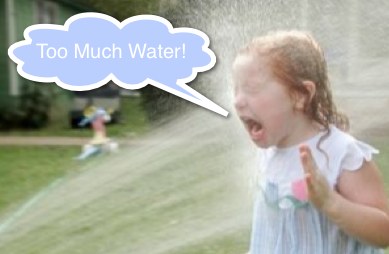Hydration and Status Asthmaticus
We are all proficient at the management of asthma exacerbations. Regardless of the season, there are always innumerable triggers of reactive airway disease and, hence, we have become very adept at its management. Certainly, though, it can still generate significant morbidity and mortality and should never be taken lightly {remember to be ever vigilant, even when very comfortable}. Additionally, there can still be some questions about the management of these patients – particularly, the very sick ones.
One of our Morsels subscribers recently posed one of these questions (ask and ye shall receive): what is the appropriate fluid management of a patient in status asthmaticus?
Patients with severe asthma exacerbations tend to be dehydrated.
- Fever and increased respiratory rate will increase insensible fluid losses.
- Illness and increased work of breathing will decrease PO fluid intake.
Dehydration can be a problem.
- Dehydration will lead to thickened secretions, which can produce mucous plugging and more ventilation and oxygenation issues.
- Children’s Cardiac Output is dependent upon Heart Rate and Preload… dehydration will decrease the preload potentially. Hyperinflation of the lungs will also decrease Preload.
Over-hydration can be a problem.
- Pt with severe asthma exacerbation will have negative intrapleaural pressures throughout the respiratory cycle, which can lead to increased left ventricular afterload.
- These forces lead to leakage of capillary fluids and promote Pulmonary Edema.
- Over-hydration can exacerbate pulmonary edema.
- There are also reported cases of SIADH occurring with severe asthma exacerbations… IV fluids and SIADH do not go well together, naturally.
So with two competing concerns, what do we do?
Aim for euvolemia!
- Is the patient in shock?
- Think about tension pneumothorax… treat accordingly.
- Think about hypovolemia and increased intrathoracic pressures leading to poor venous return leading to decreased cardiac output.
- A fluid bolus would be appropriate (plus/minus drainage of pneumothorax, naturally).
- If the patient is not in shock, assess the patient’s fluid status.
- It is likely better to be a little dry versus too wet, as the pulmonary edema will complicate the management.
- If you do not predict that the patient will be able to wean off of therapies to the point where PO hydration can be done adequately, then start maintenance fluids.
- MONITOR I/O’s well… in addition to the respiratory status (goes without saying really).
Mannix R, Bachur R. Status Asthmaticus in Children. Curr Opin Pediatr. June 2007; Vol 19(3), pp. 281-287.
Werner HA. Status Asthmaticus in Children: A Review. Chest. 2001; Vol 119, pp 1913-1929.
Bahna Sl, Kaushik SP. Water and electrolyte status in children with acute asthma. J Asthma. 1984; 21(2), pp73.79.
Straub PW, Buhlmann AA, Rossier PH. Hypovolemia in Status Asthmaticus. The Lancet, Nov 1969; Vol 294 (7627), pp. 917-968.


